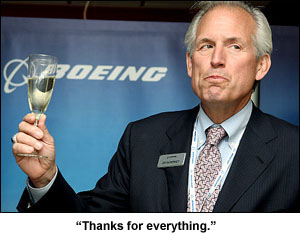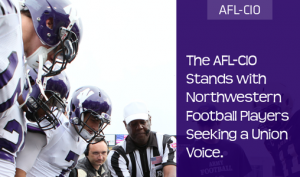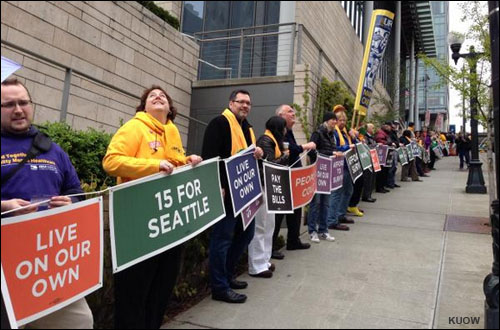NEWS ROUNDUP
Jim’s Cheap Jets™, Ed’s minimum, Arne’s waiver…
Thursday, April 24, 2014
BOEING
 ► In today’s Seattle Times — Boeing CEO defends job transfers, but experts question rationale — As Boeing announced strong earnings, Chief Executive Jim McNerney defended planned transfers of thousands of engineering jobs out of the Puget Sound region. Aviation-industry experts questioned that move. Richard Aboulafia, a longtime aviation-industry analyst, said it’s all about cutting costs: “It’s been a long time since they had a surplus of legacy engineering talent at any of the places they acquired. They are letting costs drive decisions. You wouldn’t be doing this if it wasn’t for cost,” adding that “prioritizing cost above everything else had very bad consequences for the 787. Hopefully, this time it won’t be so severe.”
► In today’s Seattle Times — Boeing CEO defends job transfers, but experts question rationale — As Boeing announced strong earnings, Chief Executive Jim McNerney defended planned transfers of thousands of engineering jobs out of the Puget Sound region. Aviation-industry experts questioned that move. Richard Aboulafia, a longtime aviation-industry analyst, said it’s all about cutting costs: “It’s been a long time since they had a surplus of legacy engineering talent at any of the places they acquired. They are letting costs drive decisions. You wouldn’t be doing this if it wasn’t for cost,” adding that “prioritizing cost above everything else had very bad consequences for the 787. Hopefully, this time it won’t be so severe.”
► In the P.S. Business Journal — Demise of pensions makes Boeing more competitive, McNerney says — Boeing CEO Jim McNerney said the share of Boeing workers not covered by a traditional fixed-pension plan soon will reach 80 percent, up from 15 percent last year. He tied the labor changes to other company moves such as distributing engineering work around the country, saying: “The changes are strategic and fundamental to the way we are restructuring the company — to reduce risk, ensure the health of our balance sheet and enhance competitive position.”
MINIMUM WAGE
► At KUOW — Seattle mayor to announce plan for raising minimum wage — Seattle Mayor Ed Murray is expected to announce his proposal for a minimum wage increase Thursday afternoon after his advisory committee was unable to reach a consensus. It will likely include some phase-in period and exceptions for small businesses and nonprofits. Supporters of a $15 minimum wage are watching closely — some have vowed to take the issue to voters directly if they don’t get what they consider an acceptable package.
► In today’s Seattle Times — Mayor’s panel fails to reach consensus on wage recommendations — The committee trying to craft a $15 minimum-wage recommendation for Seattle broke up without reaching an agreement between business and labor on Wednesday afternoon, the deadline Mayor Ed Murray had set for it to do so.
► From CNN Money — Many low-wage workers not protected by minimum wage — President Obama’s push to raise the federal minimum wage to $10.10 an hour, coupled with recent state-level increases, is welcome news for many people getting by on small paychecks. But not every low-wage worker has to be paid the minimum wage.
LOCAL
► In today’s News Tribune — Tacoma’s St. Joseph Medical Center is site of informational picket line — Several dozen people marched through the day Wednesday outside Tacoma’s St. Joseph Medical Center in a picket organized by SEIU HealthCare 1199NW. Contract negotiations continue with St. Joe’s parent company, Franciscan Health System, after the contract for about 800 licensed practical nurses and support staff at the hospital expired Oct. 31.
 ► At IAM 751’s blog — Blue-Green Alliance: Invest now for jobs and the environment — Washington state could put nearly 78,000 people to work while also making strides to slow global warming and make local communities and companies more productive — if it could just get serious about repairing its aging roads, bridges and other infrastructure. That was the message labor and environmental leaders gave to elected officials during a round-table discussion April 23 at Machinists Union District Lodge 751’s Seattle Union Hall. “There’s a huge, huge jobs potential, while cleaning up the environment and growing our tax base,” said Washington State Labor Council President Jeff Johnson. “We can create tens of thousands of great, family-wage union jobs.”
► At IAM 751’s blog — Blue-Green Alliance: Invest now for jobs and the environment — Washington state could put nearly 78,000 people to work while also making strides to slow global warming and make local communities and companies more productive — if it could just get serious about repairing its aging roads, bridges and other infrastructure. That was the message labor and environmental leaders gave to elected officials during a round-table discussion April 23 at Machinists Union District Lodge 751’s Seattle Union Hall. “There’s a huge, huge jobs potential, while cleaning up the environment and growing our tax base,” said Washington State Labor Council President Jeff Johnson. “We can create tens of thousands of great, family-wage union jobs.”
► In today’s News Tribune — Multinational group proposes $1.8 billion gas-conversion plant in Tacoma — A multinational consortium of energy, chemical and investment concerns is planning the largest financial investment — $1.8 billion — ever made to create a Tacoma industrial facility if the Port of Tacoma Commission next week grants it a long-term lease on a key Tacoma Tideflats tract.
► In today’s Columbian — ILWU, United Grain deny agency’s allegations — In their long-running contract dispute, the ILWU and United Grain Corp. at the Port of Vancouver agree on at least one thing: The National Labor Relations Board’s allegations that both sides have engaged in unfair labor practices are off base.
► In today’s Seattle Times — Group seeks property-tax hike to preserve Seattle bus routes — An initiative to raise Seattle property taxes will be filed this week to pay for bus service within the city, after King County voters rejected a ballot measure for transit and roads.
► At Think Progress — Meet the companies that just promised to pull $60 million from private prisons — Three investment groups announced this week that they will divest from the two major private prison corporations that constitute a massive share of America’s prison-industrial complex. Scopia Capital, DSM, and Amica Mutual Insurance have all pledged to remove their collective investments of about $60 million from the Corrections Corporation of America and the GEO Group — the two prison companies that own 75 percent of the nation’s private prisons.
 EDITOR’S NOTE — No word from the Gates Foundation, though, which invests in GEO Group. Among other immigrant jails, the GEO Group runs the Northwest Detention Center in Tacoma, where immigrant detainees — many of them with no or modest criminal records — are imprisoned in substandard conditions that they’ve tried to protest through a hunger strike. Sign a petition urging the Gates Foundation to divest from GEO Group.
EDITOR’S NOTE — No word from the Gates Foundation, though, which invests in GEO Group. Among other immigrant jails, the GEO Group runs the Northwest Detention Center in Tacoma, where immigrant detainees — many of them with no or modest criminal records — are imprisoned in substandard conditions that they’ve tried to protest through a hunger strike. Sign a petition urging the Gates Foundation to divest from GEO Group.
COLLEGE EMPLOYEES
► In the Chronicle of Higher Education — Contingent faculty at Seattle U. can vote on union, NLRB official rules — The NLRB’s director for the Seattle region rejected the Roman Catholic university’s argument that it is too religious to fall under the federal labor board’s jurisdiction as a result of contingent faculty members’ drive to form a collective-bargaining unit affiliated with the SEIU.
MORE coverage in today’s Seattle Times.
 ► At AFL-CIO Now — Northwestern players on the verge of history — Football players at Northwestern University will make history this Friday that has nothing to do with yards gained, tackles made or touchdowns scored. They will be the first group of collegiate athletes — athletes who are the key to the $6 billion-a-year big-time college sports industry — to vote on joining a union. Just getting to the vote was a major victory for the players, whose major concerns about fairness, working conditions, safety and medical care — especially after their playing days are over but their injuries are not — were not being heard or addressed by Northwestern. That’s why the players came together on their own and decided that the best way to win a voice was through collective action and a union.
► At AFL-CIO Now — Northwestern players on the verge of history — Football players at Northwestern University will make history this Friday that has nothing to do with yards gained, tackles made or touchdowns scored. They will be the first group of collegiate athletes — athletes who are the key to the $6 billion-a-year big-time college sports industry — to vote on joining a union. Just getting to the vote was a major victory for the players, whose major concerns about fairness, working conditions, safety and medical care — especially after their playing days are over but their injuries are not — were not being heard or addressed by Northwestern. That’s why the players came together on their own and decided that the best way to win a voice was through collective action and a union.
STATE GOVERNMENT
► In today’s Seattle Times — Arne Duncan reaches decision on state’s waiver from No Child law — Federal education chief Arne Duncan has made his decision on whether to revoke Washington state’s waiver from many requirements of the federal education law known as No Child Left Behind. State officials would not confirm on Wednesday what that decision is, but over the last few weeks they have been telling school districts to prepare their budgets, assuming the U.S. Department of Education would revoke the waiver. That possibility has focused national attention on Washington, which would be the first state in the country to lose the waiver.
► In today’s Olympian — Health exchange reports 164,062 signed up for private plans — More than 164,000 state residents signed up to buy private-sector health plans under the Affordable Care Act before enrollment for coverage in 2014 ended last month. A new report said enrollees’ average plan cost was nearly $107 per month for those plans receiving a tax credit from the federal government, and tax credits averaged $276 a month.
► In today’s Tri-City Herald — State initiates dispute resolution over Hanford consent decree — The state has triggered dispute resolution for Hanford’s court-enforced consent decree after the Department of Energy rejected its proposal Friday for new deadlines and requirements.
 ► In today’s Olympian — Swing Democrat faces challenges from both sides — Sen. Tim Sheldon (“D”-Potlatch) will soon find out what voters in his independent-minded 35th District think of his move last year to join Republicans and one other Democrat to seize control of the state Senate. (At left, Sheldon appears as a news conference in 2010 to endorse Republican Rob McKenna’s failed gubernatorial campaign.)
► In today’s Olympian — Swing Democrat faces challenges from both sides — Sen. Tim Sheldon (“D”-Potlatch) will soon find out what voters in his independent-minded 35th District think of his move last year to join Republicans and one other Democrat to seize control of the state Senate. (At left, Sheldon appears as a news conference in 2010 to endorse Republican Rob McKenna’s failed gubernatorial campaign.)
► In today’s (Everett) Herald — Haugen named to Public Works Board — Former state Sen. Mary Margaret Haugen (D-Camano Island) is joining the state board which oversees distribution of millions of dollars in loans for public works projects in Washington.
FEDERAL GOVERNMENT
 ► In The Hill — Union leaders warn of effort to privatize U.S. Postal Service — A top postal union is trying to derail a deal between the U.S. Postal Service and retailer Staples, with protests in 27 states planned for Thursday. The American Postal Workers Union members and other activists who plan protests at more than 50 Staples locations in all say that the partnership is bad for both postal customers and workers and would essentially privatize some USPS operations.
► In The Hill — Union leaders warn of effort to privatize U.S. Postal Service — A top postal union is trying to derail a deal between the U.S. Postal Service and retailer Staples, with protests in 27 states planned for Thursday. The American Postal Workers Union members and other activists who plan protests at more than 50 Staples locations in all say that the partnership is bad for both postal customers and workers and would essentially privatize some USPS operations.
EDITOR’S NOTE — A similar rally was held April 10 in Burien.
► In The Hill — Obama: Time is now to reach trade pact — The president said he and and Japanese Prime Minister Shinzo Abe were “closer to agreement” on major issues like automobiles and agriculture blocking the completion of a major Pacific trade pact.
► At Politico — Obama trade push gets thumbs down from Democrats — President Barack Obama’s in Asia this week pushing a deal that almost none of his allies at home want. On the Hill, most of the pushback is coming from the president’s fellow Democrats, who say it undercuts the economic fairness argument that’s a central focus of his midterm strategy.
► In the LA Times — The Trans-Pacific Partnership: Who wins, who loses, why it matters — With President Obama set to arrive Wednesday in Tokyo for a summit with Prime Minister Shinzo Abe, thorny issues in the Trans-Pacific Partnership negotiations will be a key subjects. Here are the basics on the TPP.
► In today’s Washington Post — AFL-CIO’s Trumka meets with immigrants, calls deportations ‘unacceptable’ — AFL-CIO President Richard Trumka delivered a pep talk Tuesday to immigration advocates who arrived in Washington, D.C. this week to stage a hunger strike, pledging that the nation’s largest collection of labor unions will fight to stem deportations so immigrants can stop “feeling like your community is under attack, under siege, all the time.”
► In today’s WSJ — Black lung disease spurs new coal-mine rules — Federal officials announced tougher rules Wednesday designed to fight an uptick in black lung disease in some pockets of coal-mining country. The move represents the most significant changes to dust-control practices in mines since the 1969 Coal Mine Health and Safety Act.
NATIONAL
► In today’s Missourian — Right-to-work bill divides Missourians as it moves through legislature — In almost any other country, an individual’s right to work means a guaranteed job, often furnished by the government. In the 24 U.S. states that have right to work laws, the phrase means something else entirely: A person employed by a company that has a union does not have to join it or pay any form of dues. That’s the heart of the matter in Missouri: Union leaders say such a law weakens their organizations and their ability to negotiate good contracts for workers.
► In the Washington Post — The Volkswagen case shows why American labor law is broken (by Lydia DePillis) — Why did UAW build up the NLRB appeal so much only to yank it at the last minute and leave the question unresolved? The real answer says a lot about the state of the law that governs the relationship between workers and employers in America.
TODAY’S MUST-READ
 ► At AFL-CIO Now — One year after Rana Plaza, survivors and families struggling to survive — One year ago today, as the walls of the multistory Rana Plaza building collapsed around her, Moriom Begum was trapped, injured and unable to move in the dark, surrounded by the lifeless bodies of her co-workers. A sewing operator at New Wave Style, one of five garment factories in Rana Plaza, Morium sat pinned beneath furniture for two days before she was rescued. More than 1,100 garment workers, mostly young women, were killed when the building pancaked around them. At least 2,500 garment workers were injured. Most, like Moriom, sustained such serious and life-altering injuries that they cannot work and may never again be able to do so, throwing their survival — and the survival of their families — into question.
► At AFL-CIO Now — One year after Rana Plaza, survivors and families struggling to survive — One year ago today, as the walls of the multistory Rana Plaza building collapsed around her, Moriom Begum was trapped, injured and unable to move in the dark, surrounded by the lifeless bodies of her co-workers. A sewing operator at New Wave Style, one of five garment factories in Rana Plaza, Morium sat pinned beneath furniture for two days before she was rescued. More than 1,100 garment workers, mostly young women, were killed when the building pancaked around them. At least 2,500 garment workers were injured. Most, like Moriom, sustained such serious and life-altering injuries that they cannot work and may never again be able to do so, throwing their survival — and the survival of their families — into question.
Since the Rana Plaza disaster, 54 people have died or been injured at garment factories in Bangladesh, according to data compiled by the AFL-CIO’s Solidarity Center staff in Dhaka, the Bangladesh capital. The Rana Plaza tragedy closely followed the deadly Tazreen factory blaze, which killed 112 garment workers in November 2012. Survivors and the families of workers killed in both disasters have received little, if any, compensation, and many are struggling to survive.
The Stand posts links to Washington state and national news of interest every weekday morning by 10 a.m.






